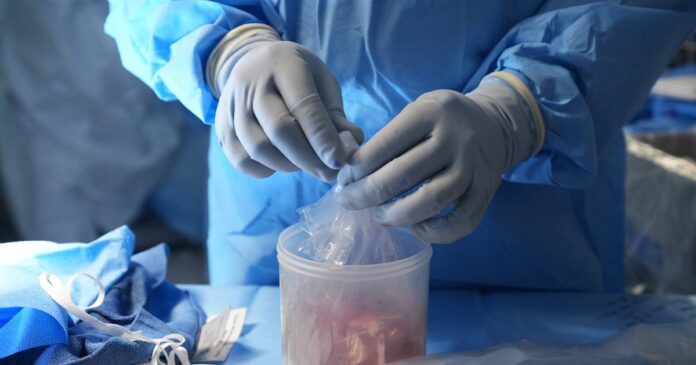Transplanting kidneys from deceased donors with HIV to recipients with HIV is safe, and the procedure should be opened up from research-only settings to the general public, a new study says.
The research, published Thursday in the New England Journal of Medicine, shows that HIV-to-HIV kidney transplants are as effective as transplants using organs from donors without human immunodeficiency virus. The findings align with a proposal from the U.S. Department of Health and Human Services to no longer require participation in clinical research for HIV-to-HIV kidney and liver transplants. If the new rule is approved, it could take effect in 2026.
The 2013 HIV Organ Policy Equity Act approved the donation of kidneys and livers among people with HIV – but only in research settings. The new study, an extension of earlier research, concluded that HIV-to-HIV kidney transplants should be expanded to routine clinical practice to help address the ongoing shortage of donor kidneys.
“Expansion of HIV-to-HIV kidney transplantation outside of research would be a win-win situation, because it will first benefit people with HIV who need kidneys by increasing the numbers of organs available from donors with HIV, and then, in turn, there will be more kidneys from donors without HIV for recipients without HIV,” one of the study’s lead authors, Dr. Christine Durand, said in a release. Durand is the medical director of the Johns Hopkins Transplant Research Center.
Johns Hopkins Medicine performed the first deceased donor HIV-to-HIV kidney and liver transplants in 2016 and the first living donor HIV-to-HIV kidney transplant in the United States in 2019 under the HOPE Act.
The new study compared 99 transplant patients with HIV who received kidneys from deceased, HIV-positive donors to 99 patients without HIV who received kidneys from donors without HIV. The one- and three-year survival rates of recipients with HIV were similar to those of recipients without HIV. The rates of survival without the loss of kidney function and kidney rejection were similar, too.
The study is a follow-up to research published in 2023 that found people with HIV can safely donate kidneys without an increased risk of developing end-stage kidney disease or other kidney problems later in life.
“The importance of the study for people living with HIV and kidney disease is that kidney transplant with the HOPE study protocol offers similar outcomes at one and three years with potential risks of worsening HIV infection that appear to have been manageable,” Dr. Joseph A. Vassalotti, chief medical officer of the National Kidney Foundation, said in an email. Vassalotti was not involved in the study.
Kidney disease, also known as chronic kidney disease, has been called an “under-recognized public health crisis,” because it causes more deaths each year than breast cancer or prostate cancer, according to data compiled by the National Kidney Foundation. Kidney disease is the eighth leading cause of death in the United States. More than 1 in 7 adults – about 35.5 million people – are estimated to have the disease.
The best treatment for kidney disease is early detection so that its progression can be stemmed or halted. But about 40% of adults with severe kidney disease don’t know they have it, the National Kidney Foundation reports. People with kidney disease who are not diagnosed early enough may need dialysis, a process that filters waste and excess fluid from the blood.
Of the more than 106,000 people on the national organ donation transplant waiting list, 92,000 of them – 87% – are waiting for kidneys, and 12 people die every day on the kidney transplant waiting list. People with HIV have a higher risk of death while on the organ donor waitlist and less access to transplants than people without HIV.



